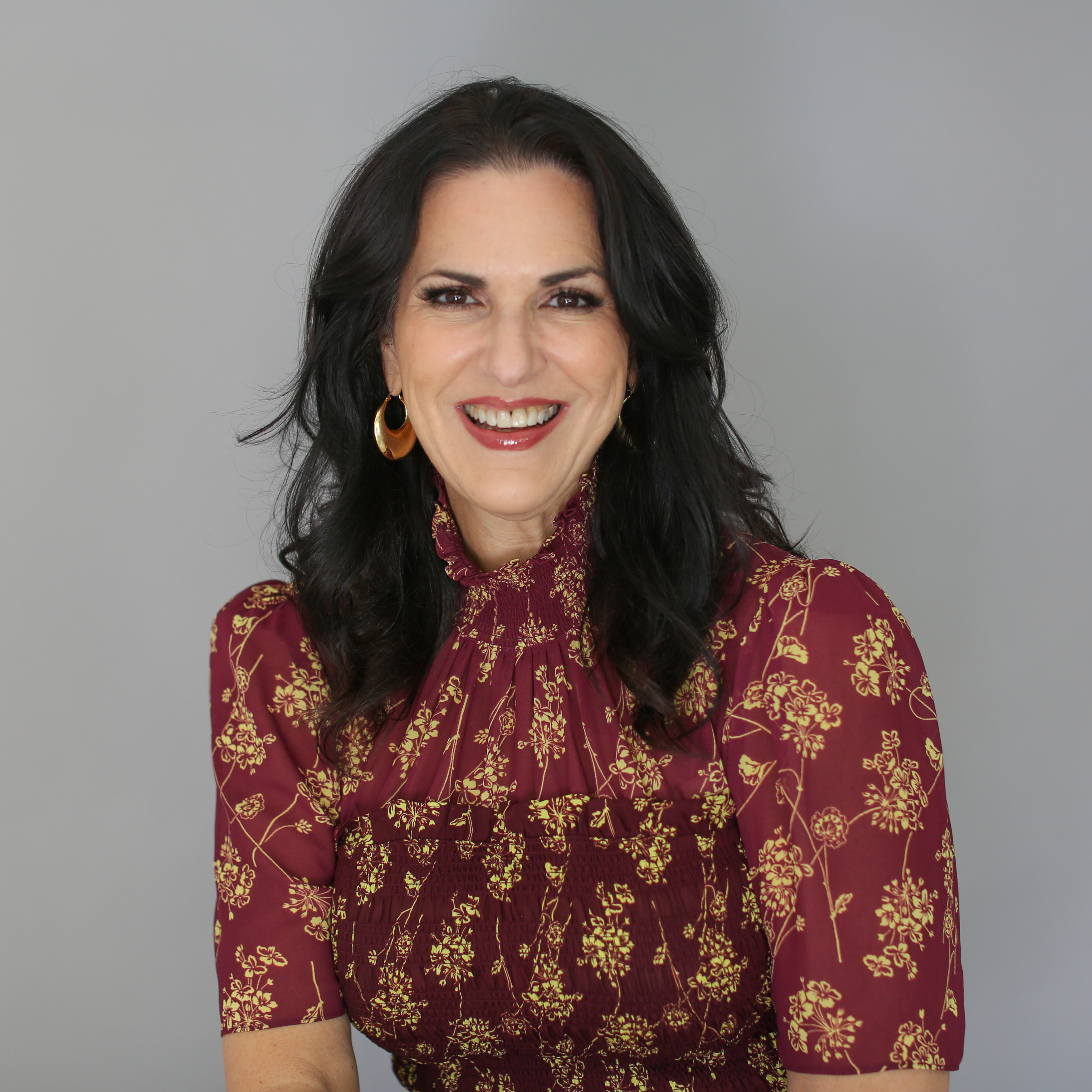Ruthless Compassion is a podcast about how you can turn your emotional shit into fertilizer for success and see your darkest moments as opportunities to transform into a powerful kindness warrior. If you enjoy this podcast, please leave a review wherever you listen.
Welcome Laura Carney to the Ruthless Compassion podcast.
Hi, thank you for having me.
Well, I'm very excited to talk to you today because I think that what you're doing is really interesting and really inspiring. So before we get into that, why don't you tell us a little bit about yourself and how you got onto this very interesting journey.
Sure. I work mostly as a magazine copy editor and also I do books once in a while in a national magazine, Vanity Fair, GQ, People. I worked in women's magazines for most of my career. I was at Good Housekeeping for almost a decade, and I'm also a writer, but I tend to find that copy editing pays the bills a little bit more of my frequent occupation. And my father passed away when I was 25, right after I actually just moved to New York for my first magazine internship. And he died because of a distracted driver, a teenager who got lost and she picked up her phone and made a call and made it so that she didn't see the red light and crashed right into him. I'm not going to say I did great dealing with that the first couple of years just because of my age and also because in some ways I had a bit of a complicated relationship with my dad and there were some areas there that would have benefited from some closure or some conversations with him at the end. And as you know that it's not a thing that happens very easily if someone is just suddenly and tragically killed. And yeah, I really didn't do very well with processing that and moving forward in my life. And instead I just sort of put it aside and thought, well, if I just had this really successful life as an adult, I can still be happy anyway. And essentially when I was 35, my husband proposed and I had been dating the same guy since my father died.
Like, my dad actually met him and then he died five days later. And when that happened, it's almost like I guess the best way I can explain it is my soul sort of, like, jumped back into my body, if that makes sense. It was like I was making this major life commitment and it was sort of making me feel very present and very alive. And that was when everything really started changing for me. I became a runner. I ran the New York City Marathon, and I had to find a way to cope with the fact that my dad wasn't going to be there to walk me down the aisle. I don't think it's a coincidence anymore. At the time, I thought it was a story came across my desk at work one day about distracted driving and saying that this man was trying to raise awareness in high schools because his 21 year old daughter was killed by a truck driver who I believe he was reaching for an iced tea and his cell phone at the same time. And it took all the courage I could muster to call this man because I just felt just this feeling of fate.
I can't believe I'm finally learning what this thing is. I killed my father. And maybe I'm meant to be part of this. So obviously, as a copier, I wouldn't normally call the subjects of the stories I was working on, but it just felt like something I was meant to do. So I called the man, and I started speaking in high schools with him, and then I started training for marathons to raise money for him. And by the time I did walk down the aisle, I felt like I was walking down the aisle triumphant and not like a victim, because in some ways I had taken some steps and done some work to help another bride out there who might have lost her father the same way. However, at the same time, I wasn't always fully satisfied with the kind of activism I was doing, because it kind of required repeating the same story about how my father was killed over and over again. And to me, it almost felt antithetical to who he was as a person, because he was just one of those larger than life personalities and just so filled with joy and always spreading joy to other people.
And I was also sort of worried that the more people heard my story, the more they could almost sort of brush it aside, just because I think we do that sometimes. I think sometimes if we hear about tragedy, it's like, I have to not think about that, or that probably won't happen to me. And I was really seeking for some way to connect with people on a deeper level, almost make them feel like this could have been their dad. And the thing that kept coming into my mind was, what if this were a movie? I remember being a teenager I'm really showing my age here, but I remember being a teenager and going to see Philadelphia starring Tom Hanks and how much that really changed the way people thought about AIDS. And I just saw someone playing my dad in a movie and having it have the same effect. So I was thinking, okay, well, I'll write a book about the experience, and then it'll be a movie. And then five or six months later, after my wedding, my dad's bucket list showed up, which no one even knew that he ever had. My mom knew about it, but it was sort of like she found it when I was a baby, and it was sort of like a private joke because some of the items on it just like, I can't believe you want to correspond with the Pope.
We just had a child, and other than that, though, nobody knew about it. And it was this very Kismet moment where I first saw it. My brother gave it to me when we were visiting him, and I just knew, I need to finish this, and this is what the book is. And my husband, thank goodness, had the same exact thought at the same time and said it out loud because I always liked a joke. If he didn't, I'd be in trouble, because he's actually been the person who has helped me the most on this journey. And it's been a life changing experience. This happened five years ago, and I have about 43 items done now. I just last month sold my book on book proposal. I'm still finishing writing it because I'm actually still living the list, and there was a pandemic thrown in there. So it's a little bit longer than I thought it would. I had no idea, when I set out to do this with noble intentions, how much healing I needed and how it was actually going to change my entire life and change my life view in general.
That's an amazing thing. So you have taken on your father's bucket list, and I see, because I have a copy of it in front of me, I see there are 60 items, and some of them seem fairly straightforward, and some of them seem quite grandiose. So how do you tackle some of the really big ones, like correspond with the Pope or talk to the president? How do you go about that?
Some of them, I have to say, seem grandiose and actually end up being much easier than you would suspect. One of the trends I've noticed with the list is the ones that seem very easy sometimes can be the hardest, and the ones that seem the hardest sometimes can be the easiest. And also, the way I look at the list is it's my experience of doing his dreams. So whatever it is that I need to learn a lesson about in life, if whatever I've done to accomplish a list item makes that happen, then I consider it accomplished. So, for example, talk with the president. At the time, Donald Trump was president, and I wasn't just, like, chomping at the bit to talk to that guy. I was in an interview on Inside Edition, and a man in Alabama saw it, and he emailed me and he said, if any president will do, jimmy Carter teaches Sunday school every Sunday. Still in Plains, Georgia. And it occurred to me my dad wrote this list in 1978 when I was a baby, and that's who was president when he wrote it. So that's who he was talking about.
And my dad was a writer as well. He self published this book of essays. So I was like, scouring the book looking for any mention of Jimmy Carter. Luckily I did find one and that ended up being the President. Even that had its complications too, because it's not like Jimmy Carter just has long conversations with everyone who goes to his Sunday school. So it took a lot of faith to make that one happen. And we were at the right hotel at the right time and met his biographer. And I was so being the journalist that I am. I was so well researched on Jimmy Carter after a week of watching documentaries and reading about him that I just had this conversation with the guy for 3 hours in a parking lot and he behind the scenes the rest of that weekend was putting in a good word for me so that he could make sure that Jimmy Carter was at least going to say three sentences to me when I took a picture with him at the end of his Sunday school lessons. So to me that counted as being checked off. Correspond with the Pope.
That's one I'm still working on. I have about eleven left. Now, my goal is to finish in September because I have to have my manuscript in by October. But I'm noticing I've been keeping a lot of hardest ones for the end. And that one I actually spoke to a priest in New York who has some connections to him and he gave me some advice about who I may be my chancellor out here in New Jersey. And it's interesting because even if something seems really daunting or scary, there's always like a helper who shows up, like almost by divine intervention or something. And one thing I've learned doing this is as long as I let go of what I think needs to happen just in my little human mind, things tend to work out. Because as I started doing this list started to realize this is really is bigger than me. Because it's not just my dreams. My dream is to write a book and to honor my dad. But it's my dad's 54 unlived dreams. So surely his spirit has something to say about that. So I have felt a really close connection to him even after his life has been over.
That's wonderful. You said that some of the easiest sounding ones were harder, which were those.
I still have not checked off the number one seed in a tennis tournament, which may be to your listeners, to our normal people think that doesn't sound so easy to be. I thought, well, I played tennis in high school, on the tennis team. This is going to be a cinch. And that I think, is probably the greatest example of one of my biggest mistakes I've encountered a few times doing this, which is anytime I get arrogant and think this will be easy, I really run into trouble. Or if I'm doing anything that starts to feel self promoting in any way, I run into trouble. So on that particular one, I set it up so that I could play tennis with my husband's best friend, who was a tennis coach, who was the best man in our wedding. And he said he was going to be easy on me. I don't know what his definition of easy is, but I had to leap for a backhand, and I ended up tearing a tendon in my foot. And that was like on day one. And I went through that. This is like the second year of doing the list.
And I went through that entire summer hobbling around, just taping it up, kind of ignoring it. Eventually realized, okay, I have to see a doctor. And then I found I had to get surgery. So by that winter, I couldn't walk. I was laid up on the couch for two months. But at the same time, that list item has to be up there with the ones that gave me the most important lessons because one of the results of that was I had to let my husband help me. I had to let him bring me food and help me walk to the bathroom. And it revealed to me, oh, my God, it's really hard for me to let go. It's really hard for me to not be self-sufficient and not be independent, and probably something I developed as a kid because my parents were divorced and I was very independent at that time, and I just didn't want to let myself depend on anyone else. And thank goodness I learned that lesson because one of the things I've learned is that it's sort of like each list item leads to the next one. So had I not learned that lesson at the end of year two, then I wouldn't be able to do some of the things that happen in year three or year four.
Like what? For example?
I think probably when I checked off on a tuxedo. I don't want to say an old friend because we didn't really know each other that well when we were in college, but a guy I did know in college contacted me because he had been following my journey on Instagram. And my journey I always feel so pretentious saying that, right? Anyway, he'd been following my mission on Instagram, and he said he wanted to help with a list item. And it turned out he was a photographer. And I said the first thing that entered my mind is own a tuxedo. Because I thought, well, maybe I'll really own it in a photo shoot. And I felt really ridiculous doing that because I just thought, I'm going to look so stupid. I imagine it would be like a big man's tuxedo or something. And it actually ended up being the same list serendipity or list magic, I like to call it, happened. And a woman tuxedo just showed up in the boutique, like right below my apartment one day. And that's what I ended up wearing. And I somehow managed to have enough confidence to do this photo shoot.
And a lot of it was because I just had allowed this guy to come into my life and interview me and learn all these very personal things about me in ways I never would have when I was younger. Like, for example, the same person, his name is Adrian. I ran into him once on the subway in New York because we both had moved there after college, and I completely ignored him because I just thought, oh, my God, I don't have a job. And there's that guy I know from college and he's going to judge me, I think a pretty common experience for someone who's 25 to have, but I laugh about that with him now because now we're very good friends. So I think probably one of the most rewarding things about this project has been just these incredible relationships I've developed. And a lot of times I think it's because there's just something spiritual about that assignment of somebody helping me with this list item because in a way, they're stepping in and being my dad and with me allowing myself to be helped. It's almost like I'm saying, I trust you and I want to learn from you, and I believe in you.
And how often do we give people the opportunity to feel that way about themselves? I mean, it's quite a lot of responsibility, I think, every time they come through. For me, it's similar to how my husband did when I couldn't walk. A lot of that is healing these issues I had with my father as a teenager where I had a very hard time trusting him.
Yeah, I was going to say, it's like you're being re-parented all over again.
Yes. And in some ways, I think it helps other people as well to be treated with such high regard when they help me.
I totally agree, because I've always felt like being able to be there for another person is such an honor and such a privilege. And when someone allows you to help them, you feel so good about yourself. And so I always feel it's a gift task for help. It's a gift to the other person to trust them, like you say, and to rely on them and to ask for their help, because, like you said, you put them in such a high position. And so I always recognize it as a gift when someone reaches out for help because I feel like, okay, they really must think I have something to offer. So, yeah, I think it's a wonderful win win kind of situation.
The thing I'm always really fascinated by, too, is I would say more often than not, whatever quality is required of me to get a list item done that I'm sort of learning from whatever person it happens to be. It's usually a quality they don't believe they possess, like my friend Adrian, he didn't think he was authentically really all that confident, and yet I saw it that way and it was something I absorbed. But that happens a lot. I don't know why that is, that someone could have this incredible stand out quality and instead just think they don't have that thing. But I guess I do have some experience with that because I think I'm that way too. People have said to me on multiple occasions that this is going to sound like I'm tooting my own horn or something, but I do okay when I do interviews or public speaking, I'm all right with being in the spotlight. And that's something that growing up and certainly right before I started doing this list that I was very uncomfortable with and I definitely did not think was who I was. So I find it interesting how by the time we're adults, we sort of have come up with these definitions for ourselves of who we think we are.
But a lot of times they're not actually based on reality and rather they are based on things we've been told by others. And if you just take that extra step and kind of push yourself, you might be surprised by what you discover.
I really agree with that. I was thinking with all these interesting things on the list, like grow a watermelon, plant an apple tree, I was wondering what kinds of things do you feel like have been your biggest lessons in going through all these interesting items? Because obviously, like you say, it's more than the items.
Well, like I was saying before, that I can't force anything to happen my way, but I think also just patience, courage, faith. I was thinking about this last night, and I was thinking about how I probably needed to already be doing a couple of things in my life before I found the list in order for this to really sink in for me. And those two things where I had become a writer, I wasn't just a copy editor anymore, I was recapping TV shows. So that's the kind of writing I was doing. But still, I was getting in touch with a muse, as you might say, and that means that I was allowing my subconscious to work. I was allowing myself to channel something. Because anytime you're doing any kind of creative activity, that's really what's happening. And I started doing that, having enough courage to do that. And then when I say courage, it's like, okay, so what? My recap is being shared in some fan page somewhere. So it wasn't really that much courage. And then I also became a runner, as I was mentioning earlier, and I started training for five 5ks and then half Marathons and then Marathons.
And I think what was happening there was I was allowing myself to be uncomfortable with pain, which, you know, as a kid growing up, when I was about 16, I was diagnosed with depression, like pretty severe depression, actually. And I think there was some magic in understanding, oh, my body is in physical pain when I was training for things, and that's actually a good thing. That's not something I'm training myself to avoid. Because when you're diagnosed with depression as a kid, I think there's this effect almost of you become sort of afraid of yourself. Like, I had doctors telling me, well, you need to drop your advanced placement classes in high school because you can't handle too much stress and you're going to have a life that's going to be really affected by your limitations and don't force yourself to do too much or you might go into a depression. So for me to actively force myself to train for a marathon at 34, and for me to make myself have my voice be out there, even in a small way as a TV recapper, I'm sort of embracing these two elements that were going to end up helping me a lot with finally processing my grief.
Because grief is this acceptance of pain. I think if you're going to really walk through it and not fearing it, because if you let go of the fear of whatever's going on inside of you, at least I'm not an expert on this. It's just lived experience. But if you can face that, then you're kind of a step ahead of the game. And as far as the channeling, as a writer, like, by the time the list showed up and I started doing it, I think I had been primed to feel like my dad was helping me because now I'm writing about this thing. So it's like I'm feeling like I'm getting messages from him. I'm feeling like I'm hearing a sentence. Sometimes it doesn't sound like my own thoughts. It sounds like something that he would say. So it's almost like I have now opened myself up to receive. So I mean, that's something that really it was a lesson I really needed. And then the other thing I think is I just finally got myself into a position where I could see that life is all about choices. I think a lot of times just the nature of the society that we're in.
Like our modern society. Means that people are kind of unconscious as they go through their daily lives and we're able to just do things for the sake of convenience so easily now. All the time. Almost to the point where not only are we not really aware that we're making choices. It becomes almost impossible to own our choices and to realize like oh, that's a choice I just made. And I think in a way, if you're not doing that, you're not even fully alive. I find your philosophy for this podcast really fascinating because you talk a lot about what it means to be kind versus being nice and what it means to be fierce about loving yourself as well. And I don't know that I ever would have become this person who was really ruthless about loving myself had I not taken this on. Because I'm always thinking, oh, well, I'm doing this for love. I'm doing this because I love my father. And I'm doing this because I'm honoring his life and helping him complete his life, in a way. And by so doing that, I value it so highly that I'm always now making choices that are good for me.
Like, if something in my life is going to interfere with the list, obviously the list is going to come first. Yeah, there's things that matter more than that. But it just means that I do have a mission that I'm on and that forces me to be much more I want to say self centered, but goal oriented, I guess, is the right word for it.
And protective of yourself because you want to complete your mission.
Yeah, I think I don't want to sound sexist, but from my own lived experience, I feel that that's much more difficult for women to do. And it was for me, for sure. Oh, my God. If you looked up people, pleaser in the dictionary, that was me before I started doing this. And it's ironic if you think about it, because, again, I'm still trying to please somebody, right? Because I'm trying to finish my dad's list, but he doesn't care if I finish his list or not. He's in heaven, having a great time. I don't think of it that way. It's more for me that I'm finishing it. And to feel like the way he died doesn't define him, to feel like his life has the meaning that it deserved and that he died for a reason, that perhaps if people are invested in this story, it might change the way they drive a little bit.
It might change the way they also think about, like you said, letting go and making choices and taking responsibility for their actions and being flexible. There's so many life lessons that you can extract from this.
Well, if you think about it, the teenager who made the choice to call someone, that's a choice. That's the thing, I think, with our phones, that it's the hardest choice to be conscious of, because they're always right there. They're always right next to us. And the thing that's so funny about all of it, you ask me what has been the hardest or what's been the biggest lesson, and the whole making choices thing. I cannot remember anything more that my dad was about, but making choices. He talked about it all the time. He was very into these very early Law of Attraction esque people like Napoleon Hill. And these are things I've discovered since his death, just by finding his writings and finding his notebooks. And I had no idea that this is I mean, I knew he liked Ann Rand. I knew that was one of them. But he used to talk about the virtue of selfishness all the time and how important it is to be self-actualized. So the fact that that's the main lesson I'm getting. And also this feeling of connection with people when someone is gone, I don't believe they're really gone at all.
I believe their spirit and their energy are still there and they're just permeating you and they're permeating how you're connecting with others. So really you can keep them alive. And my dad believed that, too. So that's how I know that it's a spirit that's involved in this because it's just his trademark, these things that I've been learning.
Yeah, you were saying how one of the big lessons is about choices. But I'm thinking also that one of the lessons is about how people need to actually make an effort. Right. Like you were saying how life is so convenient and everybody just kind of coasts along because it's easy, but you're making a real concerted effort. And I think one of the reasons it's inspiring is because all these people are watching you make this effort and they want to help you. They want to jump on board because it's inspiring to see somebody working so hard towards such a big goal. Like I said, grandiose goal. Right. So by making an effort, you're able to accomplish things that maybe you never would have thought you could accomplish. And so I think it's also a lesson about how when we invest energy in a task or an emission, we could surprise ourselves at the results.
Yeah, so I'm really happy that you said that. That's really nice. And I think it's also true that if you think about somebody who has been through what I went through after he died. And it wasn't even just his death that was so challenging for me. Like I said, I was diagnosed with depression as a teenager. And just before I moved to New York, I had actually gotten to a point where a doctor had me on 13 different antidepressants in one year and I had to go to a hospital just to get off all of them. And I felt pretty bad about myself. I basically felt like I was a screw up and anything I was going to do in my life, I probably was eventually going to screw up. And I'd be lucky if I could just like, hold a job anywhere, basically. And if I did accomplish something, oh, I'm probably just fooling those people and they'll catch on eventually. That really was sort of how my inner monologue was. And I think it's easy for someone to go through life like that, trying so hard to fit in if they've been taught that they are different.
And when you do that, you're really kind of sacrificing learning about who you actually are, I think. So one of the big joys for me of doing this project has been gosh, I feel like. I'm going to cry about this. It's been having this discovery of what I can actually do and who I actually am. And I think the reason that is beginning to come out, in addition to just this great effort, as you described, that I've been making, is that it's the kind of effort that it is. It's an effort that is motivated by love. It's just using every tool I have in my toolbox, and in that way, it's making me sort of shine in other people's eyes in ways that I'm not totally seeing, in ways that I didn't expect that I was. And I think that's besides the grief component, I think that's the universal element of the project because I've always been this big fan of Joseph Campbell and Follow Your Bliss and the Power of Myth, and I was an English major, so, like, of course he always says, when you follow your bliss, doors open to you that previously were closed.
And really, that's what I have experienced, that as long as I'm being brazenly authentic, as long as I'm pursuing what absolutely brings me joy and is right for me, then these things will come to the surface that I'm meant to be doing, as opposed to I want to work really hard and see what the result is in a self-serving way. Similar to, I really loved what Dr. Gabor Mate said at the end of his interview with you. He said, make sure you become an activist if there's something you really care about, because if you let your light shine, it's going to really change your whole experience of life. And that's really what this has been for me. I'm always feeling like I'm part of something so much bigger than who I am. And that's helped me a lot with the pandemic, too, I think, because a lot of times I've been hearing people talk about how hopeless life suddenly seems or their daily habits have seriously been interrupted by this. So it's sort of like you feel a little bit lost, like, who am I now? And I mean, thank God, I had already been on this project for three years when the pandemic started, so I've already been this very mission-oriented person and therefore it didn't really touch me in that way.
What sort of has happened is more people have started coming to me and saying, like, can I learn something from what you're doing? Because all of a sudden, the usual avenues for them to find a sense of purpose and fulfillment aren't really working the same way.
And also, I think what's happened with the pandemic is it's really caused some of us, maybe many of us, to narrow our focus. We have fewer distractions, fewer ways to waste our time, so we can really focus on things that are important. And I've certainly found that for myself. I've spent the last two years writing. I've finished two novels during the pandemic. Thank you because I had not a lot of distractions, and I was very grateful in a sense. I mean, there were obviously things that I missed, but talking about ruthless compassion, it was very ruthless, and I was able to use it to complete these novels. And I think when you have that narrow focus, it can be a gift.
Yes. Oh, for sure. Especially, I was diagnosed with pretty bad ADD too. So yeah, it really helps.
So here you are. How many on the list do you still have left to do?
I have eleven left now, and you.
Have about six months to go.
Oh, my gosh. Is it really that little?
Yes.
March
yes, indeed. I have six months, but as I said, these are some of the hardest ones, and I've been working on them for five years, so it's just like I'm doing the finishing touches, in a way.
So you're going to be putting out a few songs and putting out a novel.
Yeah, well, he wanted to write and have a few novels published, and I'm a journalist and I deal with nonfiction, so to me, I felt like, well, my memoir about this experience will count as that. And then actually for Christmas this year, my wonderful husband surprised me. He's a book designer for a living, and he had taken my dad's book of essays and redesigned it without my knowledge and then published it. And now we're going to put it up for sale on Amazon. So that's my second of the few books when I have written and published, or that my dad wanted to have written and published. So I consider two to be a few. I guess I can be up for debate, and I guess neither one of them is essentially a novel, but I think, God, this book has been through so many permutations now it feels like more than one book, honestly. And that's been the hardest one. That really has, just because it's quite elite to go from being a magazine journalist who publishes essays just once in a while, to publishing an entire book, and I had an agent sending it to the biggest publishing houses, and to just let myself be that vulnerable.
I think I'm in a very vulnerable phase right now with the project because it didn't even occur to me, like, oh, my God, this book is going to sell, and what is that going to feel like? And all of a sudden have people giving me these accolades and being very interested in it. It's a very raw feeling for me because I remember two years ago when I don't want to say nobody cared, because I'm sure people cared, I was doing this, but it wasn't like, on everybody's radar. I'm happy that it happened that way, though, because I actually did that on the advice of another agent who just said, don't put yourself out there too much because it will be better to do that when you actually sell a book. So I made everything private on social media and I wasn't doing it to perform, I guess I'll put it that way. I think that's what was good about it. But I think that that helped me a lot because it helped me to remember, oh, I'm just doing this for me and for my father. And it's really just about that because I think sometimes these days people are so involved in social media that they kind of lose that a little bit.
So I've really it's really just became like a heart mission in that way. And as I go through these last three items, I'm trying to keep that in mind. I'm trying to sort of like, take it off my head that like, OK, I have this book that's going to come out because it really doesn't matter. Like, one thing that I've really learned doing this is that the journey that you're on matters so much more than the outcome. So as I experienced this last year, I've kind of noticed too, that each year of the list has a little bit of its own vibe, like its own theme. And as I go through this last year, I'm really just kind of soaking up, okay, this is what my dad stood for, this is what he was about. And now I'm at a place in my life where I am just fully channeling that and there's nothing prohibiting that anymore. There's no lingering resentment that I have. There are no fears about my own abilities that I probably inherited from him because he had those fears too. I've really kind of like, leaped past that now. And this is the part whereas my dad might say.
I don't know if my dad would say it this way. But at one point it occurred to me with these important things in life. My mom was the one who sort of made sure that I knew how to do something. But my dad was the one who made sure I knew when to really start enjoying what I was doing. So this is the time where I'm singing like my dad was a singer. So when I look at this year and yes, I'm going to record five songs and I'm actually writing songs based on my dad's poetry, so that's sort of how that one is panning out. I'm just doing my best to sort of like, go with the flow and enjoy these last few things because this is the end of it and who knows what's coming next?
We all have that question, don't we?
That's the adventure. That's the excitement of being alive, you know, like, uncertainty is awesome.
For sure. Well, where can people find you if they're looking to see where you are on this list?
I am on Instagram as @myfatherslist and also my blog is my myfatherslist.com. I don't use Twitter a whole lot, but I'm myfatherslist on there too. And I'm my father's list on Facebook, I guess.
My father's list.
That's right. It was easy to remember, you know.
Sounds good. Well, before we go, you have a call to action for the listener?
Honor your feelings and honor the people you love. I think a lot of times when we lose someone and we go through grief, it's such a unique, sometimes almost lonely experience because what you're really grieving for is that unique relationship you have with that one person. And as I was talking about before, how I think people almost overly prioritize fitting in. I think that affects the way they handle certain things like that. So I would say whatever you're feeling about this person who is still very much with you but isn't in a human body, let yourself follow those feelings. Don't worry about what anyone thinks about it. So own that love that you had for that person because that's going to change your life in good ways. Own who you are. Take some accountability for the choices you're making. I think that really is just key to living a good life and even feeling like you're alive. Whatever really is happening, even if it seems like the worst possible thing that could be happening in your life, is actually still for you if you can convince yourself that you've chosen it, if you can convince yourself like, okay, this is hard, but there must be some lesson in this.
That's what I think is really important for people.
Yeah, it's like making lemonade out of the lemons, right? Resilience is always taking these difficult times and using those opportunities for growth.
Yeah, but not in a cliche way. Not like, oh, yeah, I know people say to do that, but I don't know, I think our lessons are very unique to us. You can make that choice if you want to.
Well, thank you so much, Laura, for coming on the Ruthless Compassion podcast. It was really great talking with you. And it's not just a bunch of checkmarks on a list. It's really a bunch of experiences and life lessons, isn't it?
Yeah, I needed a lot of help, but I think we all do, right? We all could use the boost sometimes in self actualizing and finding more joy. So thank you.
This is Dr. Marcia Saroda. Thank you for listening. Please leave a review and your comments wherever you listen to podcasts. And don't forget to sign up for my free newsletter at marcisarota md.com, where you'll learn about upcoming online events as well. Also, we love getting referrals from our listeners about future podcast guests, so please email us at info at marcia Soroda md.com.

















